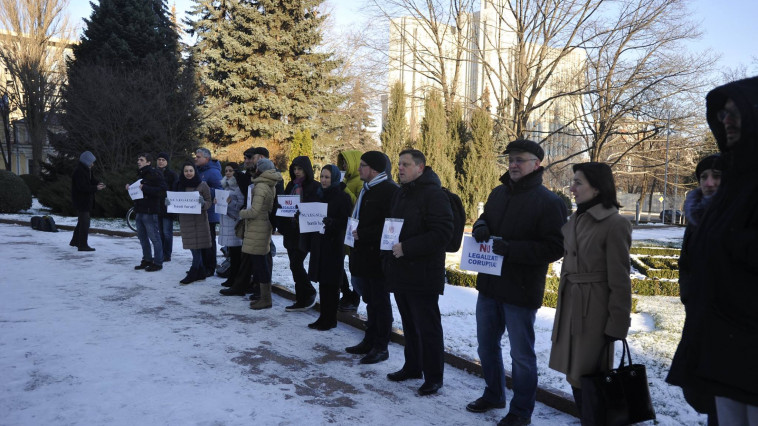PHOTO // Maia Sandu protested at the Parliament against the tax amnesty

The tax amnesty law stirs up discontent. Several people - including the PAS leader, Maia Sandu - protested today in front of the Parliament, dissatisfied that the civil society was not consulted in this regard. The protesters say that the law is suspicious.
Among the protesters was the Action and Solidarity Party leader, Maia Sandu, who told the press that "this law will legalize the stolen money."
"The message is very simple, you can not approve a law contested by the civil society, because we believe that this law will legalize the stolen money. Or we believe that those who stole the money should be sanctioned and that such a disputed law can not be approved in a hurry without being consulted. We saw that they tried to make some debates, that have been mimed, with guests who are agreed by the governance. It is not the only case, because the government has decided to ignore civil society, the citizens and rule without organizing participatory processes," said Maia Sandu.
The Promo-LEX program director, Pavel Postica, says that "this doubtful project leads to the idea that it comes to legalize the money which were stolen by the scheme of theft of the billion".
"The main risk is that illegal money or apparently illegal could be legalized, and in Moldova's economy could enter dirty money. Apparently there have been mimed some debates, on the inside, within the coalition. But the debate was announced one day before and we have not had the opportunity to participate in these debates. Moreover, there are laws in Moldova, particularly on the transparency of decisions, which obliges the authorities to respect some standard deadlines," added Postica.
According to the bill, individuals will benefit from the liberalization of the capital, and for legal persons only provides fiscal stimulus the project. The process will consists in two stages:
- The declaration of intention
- The request of liberalization with a fee of 2%.
Capital liberalization gives individuals the opportunity to declare and to liberalize capital that previously were not declared. This refers both to money means and the estate, securities, equity shares in the capital of limited companies, road transportation etc. It can be subjected to capital liberalization which was not previously an object of taxation, avoiding the fiscal penalty. In this way, the project offers a unique opportunity to bring into legally use certain goods or money, by paying a fee of 2% of the liberalized assets.
The capital liberalization entails:
- To declare the capital which was not previously declared
- To transfer the capital from the formal holder's name on the real holder's name
- To reflect the true market value of the assets in order to optimize the structure of assets and subsequent taxation.
As for the keep fiscal stimulus this means, according to the initiative, the cancellation of debts to the budget in the form of penalties, on the condition that they pay the basic amount of debt and the transfer fee of 2%.














